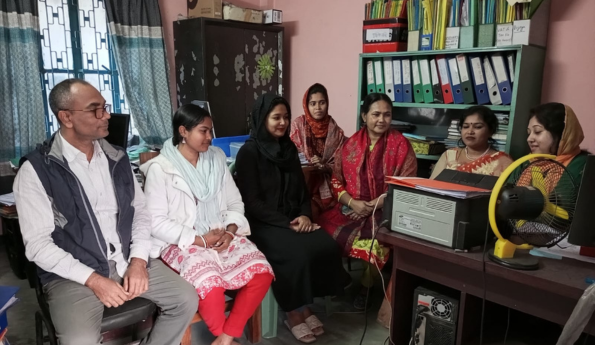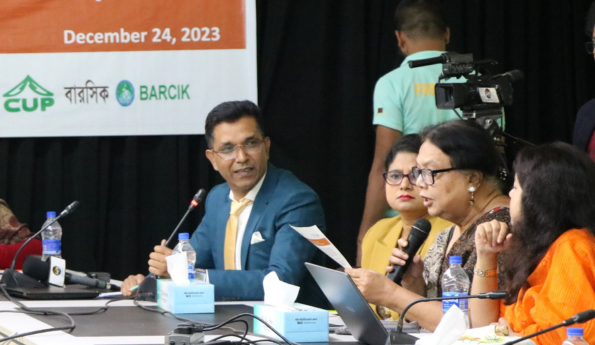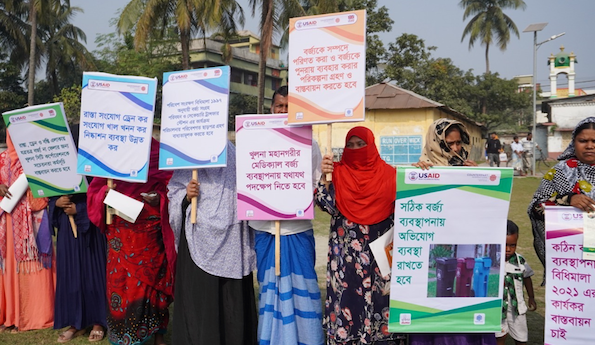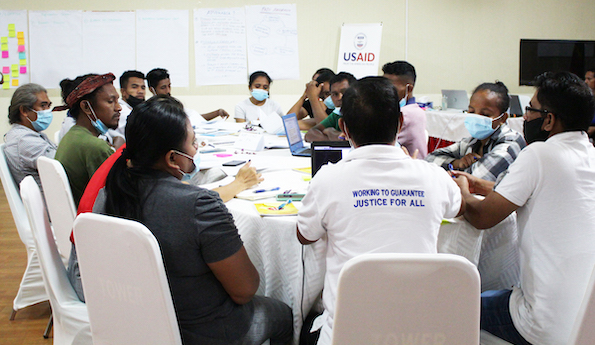On January 7, 2024, Bangladesh held parliamentary elections, resulting in the Awami League securing another term—and raising questions about whether the civic space will continue to shrink. Here, Counterpart’s governance expert, Mehreen Farooq, and chief of party for the Promoting Advocacy and Rights Activity, Katie Croake, offer promising practices to maintain civic space and promote inclusive civic participation.
At first glance, there are few changes to the political landscape in Bangladesh compared to how it looked in April 2018 when Counterpart International began implementing the USAID-funded Promoting Advocacy and Rights Activity. The January 2024 elections confirmed another term for the incumbent party. But when you take a closer look at civil society, there has been significant change in the past six years.
When the project first launched, Bangladeshis were reluctant to discuss politics in public spaces above an audible whisper. But now, our partners have proven that it is possible for civil society to exercise their voice and demand better governance.
In the months leading up to the recent elections, our partners engaged with 217 political leaders and 46 parliamentary candidates about critical local issues: solid waste management, environmental pollution, river protection, and the meaningful inclusion of historically marginalized groups.
Cumulatively, they secured 263 commitments from political leaders and parliamentary candidates to advance citizen-led recommendations. Many of these issues were also included in election manifestos. For example, the Awami League and Jatiya Party incorporated priorities related to unplanned urbanization and environmental protection. Notably, the Awami League also included the rights and well-being of Dalit and Horijan communities for the first time—a significant outcome for two of the most marginalized populations in Bangladesh.

DSK shared their citizen led recommendations to Saber Hossain, the newly appointed minister of the MoEF&CC.
3 keys to protecting civic space and human rights
The project succeeded by steering clear of traditional paths. Here are three things we did not do:
1. We avoided rights-based approaches that focus narrowly on deficits and demand equitable resource allocation and human rights for all. Historically, these approaches tend to put public officials and candidates on the defensive—creating an antagonistic dynamic between civil society and the public sector. Instead, we supported civil society to advocate in a politically sensitive manner—offering policymakers solutions, not just problems. In Khulna, one of our partners addressed water sanitation, drainage, and waste management issues by drawing up a model municipality concept—a model ward that illustrated how residents, the private sector, and the local municipality could work together to improve critical service delivery for all. Our local partner also created a working group to monitor and report on progress. The mayor of Khulna valued the approach so much, he gave his full support to several wards to achieve “model ward status.” Local private companies also joined the effort and are installing clean drinking water stations in historically underserved slum dwellings.
2. We didn’t limit our civil society engagement to those actors with entrenched political biases. Instead, we supported new civic leaders in their communities who were eager to present innovative solutions. In slums, we supported and coached young women to become leaders within their communities. In many instances, traditional gatekeepers—all men—were so impressed with the results that they stepped aside to let the emerging leaders address other pressing community needs as well. We also avoided large scale events where we knew our civic partners would not feel safe, and instead opted for smaller events. These sessions were well-suited for women and historically marginalized stakeholders who reported feeling more comfortable engaging in roundtable dialogues. In partnership with the International Center for Not-for-Profit Law, we also continued to support civil society in understanding the legal landscape and navigating digital advocacy in light of the Cyber Security Act.
3. We didn’t let politics drown out civic voices. We strengthened advocacy efforts by conducting a strategic messaging workshop in October 2023. As election day drew closer, we also supported targeted media engagements to mainstream the voice of civil society in providing policy recommendations. Within a 2-month period, the media published dozens of news articles supporting environmental reform and Dalit issues.
As a result of this sustained advocacy, within a week of assuming office, Minister Sabir Hussein Chaudry, Minister of Environment, Forest and Climate Change, contacted our partners to advance their environmental policy recommendations—a promising indication that the civic space can expand once again.
By understanding and navigating the complex political economy, our team has demonstrated that the international community can continue to support Bangladeshis in maintaining civic space and advocating for improved governance. Bangladeshis from across the social and political spectrum have demonstrated that there is the political will and potential to do more.






